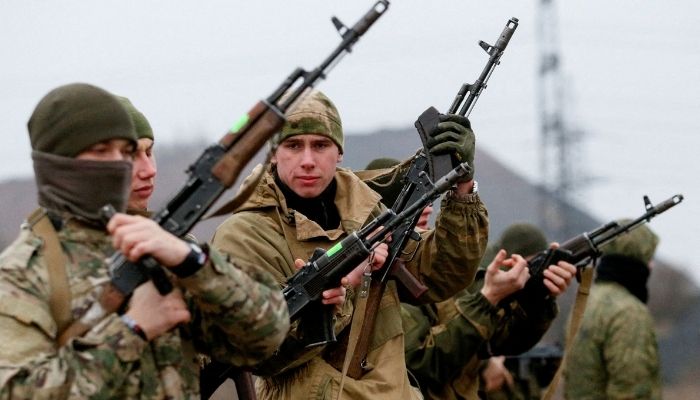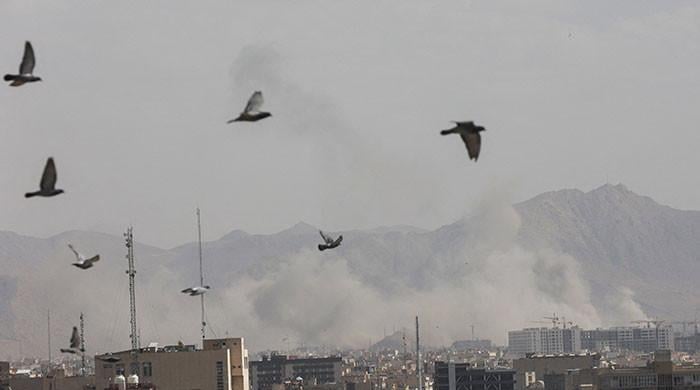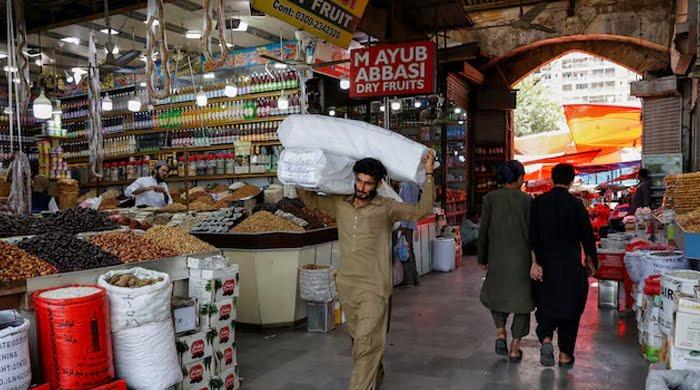Donbas Eastern Ukraine: Flashpoint in Russia's escalating crisis
The Donbas region of eastern Ukraine declared independence in 2014 following Russia's reintegration of Crimea
February 23, 2022

The eastern Ukraine region of Donbas has been a flash point in Russia's escalating crisis with Ukraine, which is centered around land borders and strategic influence.
The Donbas region of eastern Ukraine declared independence in 2014 following Russia's reintegration of Crimea.
The region turned volatile on Monday, when Russian President Vladimir Putin recognised the independence of two Moscow-backed breakaway enclaves known as the Donetsk and Luhansk People's Republics. Additionally, the Russian president issued decrees directing military forces to enter the region for "peacekeeping" purposes. The formal recognition is a significant escalation that signals the end of the seven-year-old Minsk peace agreement.
Tatiana, a resident of Lviv, a large Ukrainian city on the eastern border with Poland, told Geo News that it's better if people don't want to live together; there's no reason to fight.
Eastern and western Ukraine have divergent political views on the country's unity, and the Ukrainian people now have the opportunity to join the European Union and NATO, but the question is whether the European Union and NATO will accept Ukraine as a member?
A senior journalist, Dr Mujahid Mirza, who is based in Moscow, told Geo News that in his speech, President Vladimir Putin particularly focused on the last decade, by stating that the Luhansk and Donetsk republics were formed independently from eastern Ukraine in May 2014. Since then, Russia has provided a variety of humanitarian, financial, and covert military assistance to the Russian-speaking population. In other words, he said that an attack on these cities will now be considered an attack on Russia.
Now, even if NATO invades Ukraine, Russia has two "buffer states."
Dr Mirza continued, "I do not believe a war will occur, but Russia will face more severe economic and political sanctions from the West; Russia is a patient and strong country."
Ukraine between Russia vs US and allies
The US and the UK continue to supply Ukraine with heavy weaponry in the name of Ukraine's defence. NATO Secretary-General Anders Fogh Rasmussen announced his visit to Russia in a statement issued following a two-day meeting of NATO defence ministers on February 17-16. He warned that if Russia invaded Ukraine, the repercussions would be "extremely serious" for Russia. NATO threatens Russia with a financial boycott if it does not halt its aggression.
Only time will tell how far Western leaders' threats at the NATO defence forum and the Munich Security Conference in Europe compelled Russia to resolve the Ukraine conflict.
Ukraine has been in the hands of opportunistic, corrupt politicians and the establishment since its inception.
Ukraine's political crisis began in 2014, when pro-Russian Ukrainian President Viktor Yanukovych was forcibly ousted by pro-Western opposition following a lengthy sit-in backed by the US. Yanukovych then fled to Russia and remained there throughout his presidency, preferring Russia to the West in order to improve the country's economic situation. He accepted a $15 billion aid package from Russia despite Russia's refusal to join the European Union.
In the same year of 2014, Russia stepped forward and annexed the Crimea Peninsula on the Black Sea, where 75% of the population is Russian. Crimea is home to 12% of Tatar Muslims.
The majority of Ukrainians living in Eastern Ukraine are of Russian ancestry and oppose the central government of Ukraine; they want their own country or to join Russia. Simultaneously, Russia ceded significant territory to Ukraine during the Soviet Union era, when Khrocheve served as Secretary General of the Soviet Communist Party.
NATO, the Western alliance, has been building a siege around Russia since 2004. Despite the fact that NATO and Russia reached an agreement, Russia guaranteed that Poland, Lithuania, Estonia, and Latvia would not join NATO. However, NATO later violated this understanding and expanded eastward into Europe. Three former Soviet republics, Poland, Lithuania, Estonia, and Latvia, have joined the NATO.
Not only has NATO expanded, it has also installed modern artillery in Estonia capable of attacking Russia's St. Petersburg.
Ukraine's pro-Western leaders established the "NATO Ukraine Commission" in 1997 to facilitate the country's accession to NATO. The commission has been attempting to prepare Ukrainians for NATO membership, but NATO'S expansion to the eastward is contentious. Ukraine's population is divided on NATO membership. Both Eastern and Southern Ukrainians oppose NATO membership. That is why Ukraine's accession has not been completed yet. NATO has stepped up its efforts to enlist Ukraine in the alliance once again in the aftermath of the NATO bloc's presence on Russia's border and Russia's occupation of Crimea during the crisis.
On the one hand, Russia has halted the supply of cheap gas to Ukraine; on the other hand, Russia has ignored Poland and Ukraine.
Pipeline Nord Stream
Russia and Germany have invested €10 billion in the Nord Stream 2 pipeline in order to supply gas directly to Western countries.
Poland is adamantly opposed to this gas pipeline due to Germany's and Russia's neglect of Poland. Europe currently imports 40% of its energy from Russia while it's energy dependence on Russia will grow in the future, which is another concern point for the US.
On the other hand, relations between Europe and the US have been strained on several occasions in recent years. France, Belgium, and Germany, in particular, opposed the US invasion of Iraq and cut off funding to NATO. Under US President Donald Trump, relations between Germany and the US deteriorated, and Germany built the $10 billion Nord Stream 2 despite strong US opposition. In this context, the US seeks to contain Europe's growing economic cooperation with Russia, as well as the central government of Ukraine. While a majority of Ukrainians desire membership in the European Union, the country is divided over NATO membership.
Eastern Ukraine is home to the majority of Russian speakers. These Russian backers have instigated a revolt against Ukraine's central government. They want Russia to annexe eastern Ukraine. Meanwhile, Russia wishes to include Odessa, a Russian-speaking city with a population of 75% Russian speakers.
Relations between Russia and China
Russia has a long-term strategy for cooperation with China, which concerns the US in particular. Both are significantly strengthened and stable countries. More so, President Putin of Russia recently visited China and signed a number of agreements strengthening relations between the two countries. However, China issued a critical statement in response to Russia's recent incursion into eastern Ukraine's Donbas region.
In the context of Ukraine, tensions between Russia and the United States energy prices have been increasing in Europe, which has created unease among the populace. The longer the tension between Russia and Ukraine persists, the higher the energy price will be.
While US and UK are supplying Ukraine with heavy number of arms, the Ukrainian citizens told Geo News that they need economic stability and job opportunities, not weapons.











